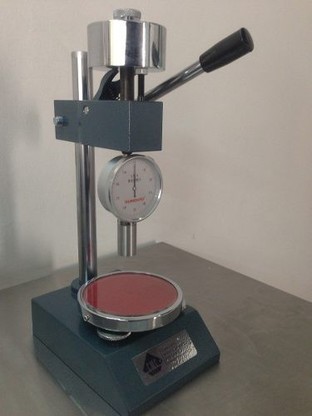A dynamometer is a lab instrument that can be used to carry out two different types of mechanical tests: tensile testing and flexural testing. The dynamometer is composed of two vertical columns joined by a fixed beam and a mobile beam.
For the tensile test (ISO 527), the sample which shows a dogbone shape is clamped vertically between two beams and the mobile beam moves at a given speed rate with the purpose of drawing the force/deformation curve. Tested sample submits a constant deformation over time until breaking or deformating (lengthening) point which is considered as a peak of resistance.
The dynamometer is involved in flexural testing (ISO 178). Sample is clamped on the lower beam together with a support and then a load is applied to its centre until breaking or deformation point which is considered as predetermined point.

